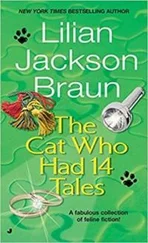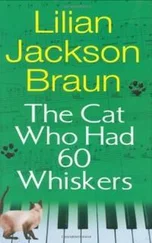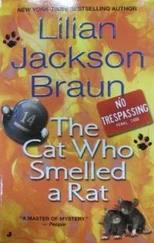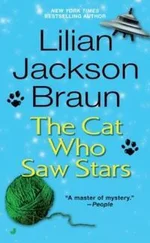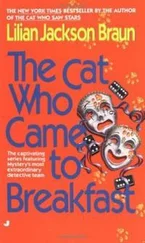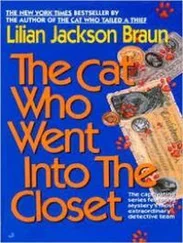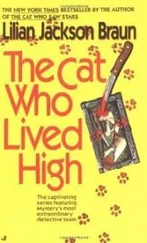“I could do that. When would you need the information?”
Qwilleran recognized a glint in her eyes, and he chuckled to think, This is a gamble, but . . . no harm in trying. “It’s like this,” and he explained his curiosity about Kao K’o Kung’s antecedents—just enough to capture her interest.
After that, he went home and waited for Gary’s phone call.
“How d’you like that greedy little monster? Everyone knows her parents left her a big trust, and she’ll inherit from her grandmother!”
“What did you tell her?”
“I told her we have two hundred volunteers working on this celebration for nothing, but we’d be glad to take up a collection from the audience at each performance—to benefit Mr. Qwilleran’s assistant. She backed down. But we’d better have an understudy on hand. She could get her revenge by being a no-show.”
“Got any ideas, Gary?”
“Tell you what, my wife could handle the job, although she has her hands full with running the marina and organizing the parade of boats. Have you met her, Qwill? Maxine’s as smart as they come!”
“Then what’s she doing married to you, Gary?” Qwilleran quipped, and the conversation ended in an outburst of friendly jibes.
Qwilleran began work on the script for “The Great Storm.” There would have to be a few introductory words of welcome to the audience. Previously, Qwilleran’s assistant had done the honors, but both Hixie Rice and Nancy Fincher had been personable young women with pleasing voices. Alicia’s classic features were not made for smiling, and her throaty voice, when projected to fill the banquet room, might sound like a croak. In an emergency, Gary himself might extend the welcome, although his high-pitched voice and bearish hulk would surely produce titters in the audience. And Qwilleran still preferred a woman—a young woman.
Then he thought of Gary’s wife. He had said she was sharp, but was she personable? What kind of woman, Qwilleran had often wondered, would marry the eccentric, hairy hotelier—no matter how amiable his personality? The matter would bear investigation.
Meanwhile, he went to work on the script, starting with the welcome to the audience:
Welcome to “The Great Storm of 1913,” an original drama written and performed by Jim Qwilleran, based on historical research by Thornton Haggis. You will have to imagine that home radios actually existed in 1913, as you listen to a broadcast covering the worst storm of the century—sinking ships and destroying communities along the shore. The scene is the newsroom of station WPKX in the tower of the county courthouse.
(Room lights black out)
(Stage lights up showing a plain wood table—downstage center—with table mike [fake], upright telephone [disconnected], and a plain wooden chair. At stage right, the studio engineer is seated at the controls. Enter: newscaster wearing heavy mackinaw and heavy boots. He throws script on table, hangs coat over back of chair, tests mike. Music comes from speakers: Gounod’s “Waltz” from
Faust.
Music fades out as voice of station announcer comes over speakers.)
This is station WPKX, Pickax, with up-to-the-minute news about a storm caused by three low-pressure systems clashing over the lake. . . . But first a word from our sponsors. . . . Lanspeak Department Store is offering men’s all-wool three-piece suits for three dollars, including a free necktie if purchased the first day. Toodle’s Grocery has three specials while they last: fresh pineapples, fifteen cents; oranges, ten cents a dozen; and asparagus, two bunches for a quarter. . . . Pickax Garage says, “If you are trading your buggy in on an automobile, order now and take advantage of 1913 prices: a Maxwell touring car for six hundred dollars or a Maxwell runabout for five-fifty. Headlights and windshields included.” And now for the news!
That was all Qwilleran had time to write before dressing for dinner. He had to chuckle at the 1913 prices and thought they would amuse the audience. The fifteen-cent pineapple and six-hundred-dollar motorcar were based on actual ads from the Lockmaster Logger . Next he would have to wade through Thornton’s file of storm news, garnered from historical papers in the public library collection.
All was ready for the visiting architect. Qwilleran had showered and shaved and trimmed his moustache; the cats had been given an early dinner and instructions as to the proper behavior. Suddenly—half an hour before schedule—a construction truck pulled into the barnyard, and a man in a business suit swung out of the passenger’s seat and reached into the cab for a briefcase and a piece of luggage.
Playing the genial host, Qwilleran stepped forward with hand extended. “Mr. Hedges, I presume.”
“Hodges,” the guest corrected him. “Can’t stay for dinner. Flying out on the five-thirty. Early meeting in Chicago tomorrow. Can I call a cab from here?”
Qwilleran said, “Come in and have a drink and see the barn. I’ll call a cab.”
The architect gazed up at the lofty barn as if in a trance. “Interesting!” was his final comment.
“Quite!” said Qwilleran.
“How old?”
“More than a century.” Although Qwilleran usually spoke in whole sentences, he could be concise, too.
They were being observed by two cats in the kitchen window.
“Siamese,” Hodges said, as if disclosing an esoteric fact.
“Right! Follow me. You can leave your luggage on the antique chest at the back door.”
“Safe?” was the typical city dweller’s question.
“Absolutely!”
They went around to the rear, which was really the front—with its handsome double doors, eight-sided gazebo, and flowering shrubbery filled with twittering birds.
“Bird garden,” Qwilleran pointed out. “Gazebo for the cats.”
“Octagonal,” said Hodges.
In the foyer, which was as big as a two-car garage, stood a recumbent bicycle as well as a few works of art. “You ride that?” was the question.
“All the time. Drink?”
“Scotch, with a little water.”
“Feel free to look around. Good view from the top of the ramp.”
Hodges carried his drink around in silence.
“What do you think?” Qwilleran asked when he descended from the third balcony.
“I would have done it a little differently. Who was your architect?”
“Dennis Hough—not registered. Hanged himself from a rafter when the job was finished. . . . Pour again?” Qwilleran tilted the Scotch bottle.
“A little less water this time.” Hodges leaned on the bar. “You like living here?”
“It’s not bad.”
“Hard to heat?”
“I spend winters in a condo.”
“Mrs. Duncan’s a nice woman. Ever been married?”
“Once.”
“Will a bookstore go over in this town?”
“It should.”
A taxi tooted its horn in the barnyard.
Hodges swallowed the last of his Scotch. “How long to reach the airport?”
“No telling! Deer crossings can hold you up. That’s why I told the cabdriver to come early.”
“Come and see us in Chicago” were his parting words.
“Will do,” Qwilleran said.
Once again he was glad for the tape recorder in his pocket. No one would believe the laconic conversation.
A half hour later, Qwilleran picked up Polly for the ride to Boulder House Inn. He remarked, “I thought you said Hedges was interesting.”
“Hodges,” she corrected him. “Benson knows a lot about everything, but he doesn’t say much about anything. You know, dear, I think you have a psychological block about his name, or you’re doing it to be mischievous.”
He uttered a noncommittal grunt, and Polly enjoyed an amused silence as they drove to the lakeshore.
Читать дальше

